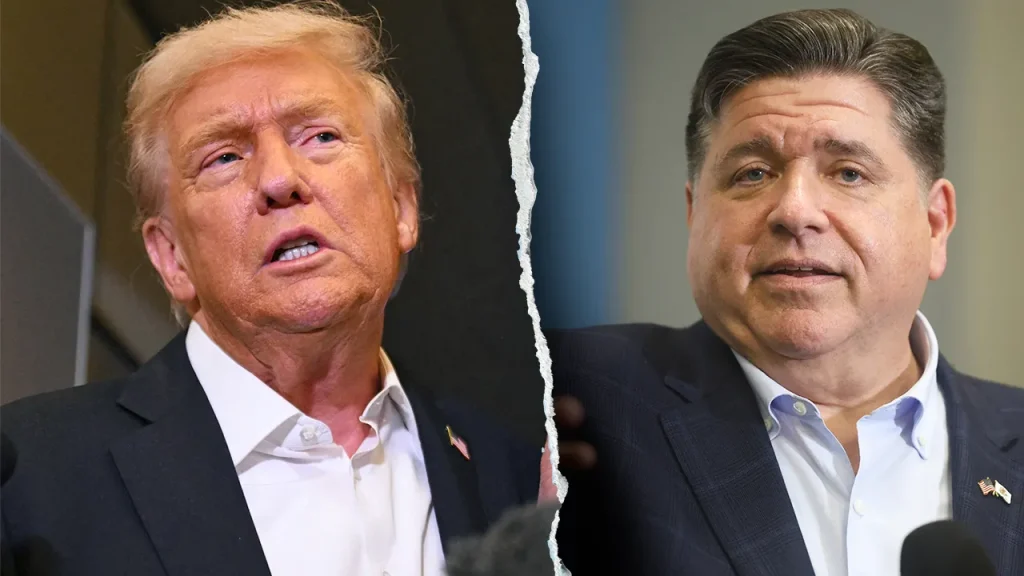Trump Suggests Invoking Insurrection Act to Address Chicago Crime, Urges Governor to “Beg for Help”
In a candid discussion with reporters aboard Air Force One following his Middle East peace tour, President Donald Trump intensified his ongoing dispute with Illinois Governor J.B. Pritzker over Chicago’s crime rates. Trump expressed frustration with crime-plagued jurisdictions across America, suggesting that governors should take a stronger stance similar to what he observed in Egypt during his recent trip. “I want them to be stronger and tougher and not allow us to have record-breaking crime in Chicago and other places,” Trump stated. He pointed to alarming statistics, claiming approximately 4,000 murders occurred in Chicago “over a fairly short period of time,” with thousands more injured by gunfire. While emphasizing what he perceives as successful crime reduction in Washington D.C. and Memphis—where he deployed the National Guard—Trump challenged Pritzker to acknowledge the severity of the situation in his state.
When questioned about potentially invoking the Insurrection Act—particularly given recent court challenges to his National Guard deployments—Trump was direct about his authority. “I could use it if I wanted to. I could use it—that’s a very simple answer. I’m allowed to use the Insurrection Act,” he asserted. Trump referenced former New Jersey Governor Chris Christie’s recent comments that presidents have the “absolute right” to use this power, noting that approximately half of all U.S. presidents have utilized the Act during their tenures. The Insurrection Act of 1807 grants presidents authority to deploy active-duty military or federalized National Guard within American borders under specific circumstances, including suppressing civil disorder or when federal laws are being obstructed. Though Trump threatened to invoke the Act during the 2020 George Floyd protests, he never formally did so.
Trump’s comments come amid ongoing legal battles regarding his National Guard deployments. Just days before his remarks, a judge ruled that National Guard troops sent to Illinois could remain but were prohibited from patrolling or protecting federal property. Despite these judicial roadblocks, Trump expressed confidence that his administration was “winning on appeal,” suggesting that while they might “lose with radical-left judges at the lower level,” higher courts would ultimately rule in their favor. This legal conflict represents a significant tension between federal authority and state autonomy in addressing public safety concerns. The president made it clear he believes he has legal grounds to intervene directly in Chicago’s affairs if necessary, though he indicated he hadn’t yet reached that point.
When asked specifically about his message for Governor Pritzker, Trump didn’t mince words: “I think he should beg for help because he’s running a bad operation.” The president accused Pritzker of allowing citizens to be killed because “he doesn’t want to deal with Chicago,” and expressed his personal affection for the city while suggesting it could quickly regain its greatness under different leadership. Trump outlined a vision of removing “criminals” from Chicago, comparing it to actions he claims his administration took in Washington D.C., where he said they “took out 1,700 career criminals—hardline criminals.” According to Trump, this approach transformed the nation’s capital: “D.C. is setting records the other way; it’s never been so safe. Restaurants have never done better—they were closing, now they’re opening new ones.”
This exchange highlights a fundamental disagreement about governance and public safety approaches between Trump and certain state leaders. The president appears frustrated with what he perceives as reluctance from some governors to acknowledge crime problems or accept federal assistance. By suggesting Pritzker should “beg for help,” Trump positions himself as ready and willing to intervene but waiting for state leaders to recognize their need for federal support. This stance reflects Trump’s broader approach to federalism, where he has consistently sought to assert presidential authority in areas traditionally left to state discretion, particularly regarding law enforcement and public safety matters.
The controversy over potential use of the Insurrection Act underscores ongoing debates about the appropriate balance between federal and state powers, especially during times of civil unrest. While Trump stressed his legal authority to deploy military forces within U.S. borders, such actions remain highly contentious among legal scholars and politicians across the political spectrum. The Act has indeed been used approximately 30 times throughout American history, most recently by President George H.W. Bush during the 1992 Los Angeles riots. However, each invocation raises significant questions about constitutional boundaries and the proper role of military forces in civilian law enforcement. Trump’s willingness to openly discuss using this extraordinary power reflects his frustration with conventional approaches to addressing urban crime and his belief in strong federal intervention when state and local efforts appear inadequate.
Throughout the exchange, Trump projected confidence in his administration’s approach to crime reduction, repeatedly contrasting what he views as successful federal interventions in certain cities with ongoing struggles in others. His assertion that Chicago could be “cleaned out” quickly under his direction reveals a stark vision of crime control that emphasizes removing individuals he characterizes as criminals rather than addressing systemic factors contributing to violence. This perspective aligns with Trump’s broader law-and-order messaging throughout his presidency. By concluding with a reference to the fact that “fifty percent of presidents have used the Insurrection Act,” Trump sought to normalize what would be an extraordinary step, framing it as a standard presidential tool rather than a measure of last resort. The ongoing tension between Trump and Pritzker exemplifies broader national divisions over crime policies, federal authority, and the most effective approaches to public safety in America’s cities.













